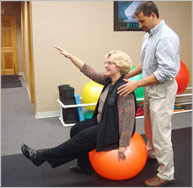Balance.
Bronstein AM, Pavlou M.
Source: Department of Clinical Neuroscience, Imperial College London, UK. a.bronstein@imperial.ac.uk
Abstract
This chapter addresses the important and undertreated problem of balance disorders.
The chapter has a simplified summary of the physiology of balance problems in order to set the scene.
The issue of assessment is next addressed with discussion of important tests including the Berg Balance Scale and the Get Up and Go Test, and others.
Posturography is discussed as well as assessment of the gravitional vertical.
The assessment of vestibular function
Re-training of postural alignment and of sensory strategies are key but adaptation of the environment and re-training of cognitive strategies are also helpful in individual cases.
Vestibular exercises can also be used.
The chapter then critically analyses the efficacy of these treatments in specific balance disorders such as in stroke, Parkinson disease, polyneuropathies, multiple sclerosis, and vestibular disorders.
Overall, there is a growing body of evidence that balance rehabilitation improves symptoms, function, and quality of life for those troubled by these disabling problems.
Source


No comments:
Post a Comment